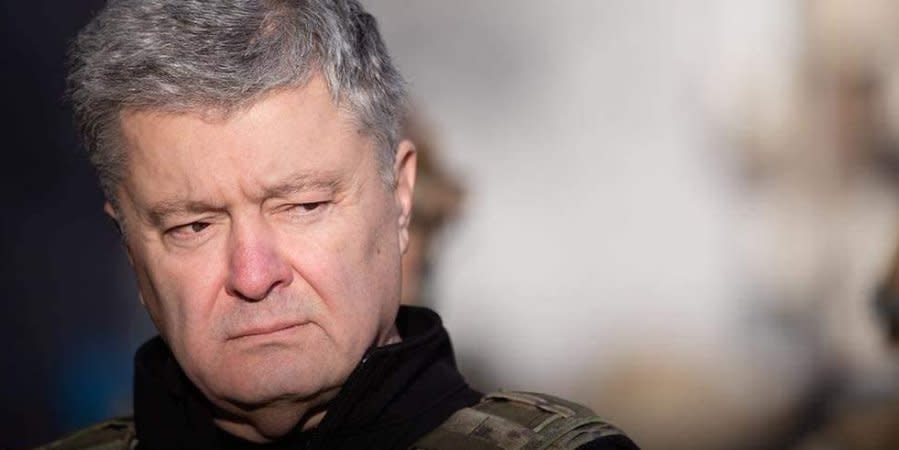Former Ukrainian president stopped at Polish border on way to NATO meeting in Lithuania

Read also: Ukraine manages to push Russians back from Severodonetsk, goes on the offensive in Kherson Oblast
Poroshenko is a member of the official delegation of country’s parliament to the NATO Parliamentary Assembly.
Iryna Gerashchenko, an MP with Poroshenko’s party, European Solidarity, wrote on Telegram that parliament Chairman Ruslan Stefanchuk had approved the list of MPs to attend the meeting in Vilnius on Ukraine’s behalf.
“However, tonight Poroshenko wasn’t allowed to cross the border,” Gerashchenko said.
“There were no explanations. The border guards at the Rava-Ruska cross point were saying something about ‘a fake or cancelled document’ (about Poroshenko’s participation in the NATO meeting), though all other MPs – including from the Servant of the People party …, or from the (pro-Russian) Opposition Platform For Life party… are able to leave the country without any problems.”
She added that European Solidarity considers this incident to be a “direct order from the authorities, who are continuing their war against Poroshenko.”
The Ukrainian Border Guard Service commented on the incident to Ukrayinska Pravda, a news and opinion website. The serivce confirmed that ex-president Poroshenko had arrived at the Rava-Ruska border checkpoint at around 11.45 p.m. on May 27.
Read also: Poroshenko treason case looks like political persecution, says NGO StateWatch
Press service for European Solidarity party published a copy of the document that says Poroshenko is a member of Verkhovna Rada’s delegation to Vilnius. Earlier on May 27, Poroshenko’s party said that he would be participating in the NATO Parliamentary Assembly meeting on May 29-30 as a Ukrainian MP.
Neither the Ukrainian Border Guard Service, nor parliament Chairman Stefanchuk provided any official comment on Poroshenko being stopped at the Polish border.
Poroshenko, who lost the presidential election in 2019 to the incumbent Volodymyr Zelensky, has been involved in a political feud with his rival ever since.
On May 23, after Poroshenko gave a lengthy interview to Financial Times in which he said that he had created the modern Ukrainian army, Ukraine’s SBU security service published a video with Viktor Medvedchuk, a pro-Russian politician.
In that video, Medvedchuk said that Poroshenko was involved in purchasing coal from Russia-controlled Donbas and in transferring a state-owned oil pipeline to private property. The European Solidarity party responded by saying it considers the SBU’s video an “informational provocation in Russia’s best interests.”
Poroshenko was officially accused of state treason and involvement in supporting terrorism on Dec. 20, 2021. In Ukraine, any business deals with entities from Russia-controlled Donbas are considered to be a terrorism-grade crime. In this particular case, Poroshenko’s alleged approval of purchasing coal from the so called “people’s republics” in the Donbas in 2014-015 has been classed as “supporting terrorism.”
According to the investigation, Ukraine’s former president used the power and influence he had at his disposal to forgo purchasing coal from South Africa, choosing coal from the Donbas instead. This was done as a response to a request from the Russian Federation, and in this way Poroshenko “made Ukraine dependent on Russian energy resources, on energy resources of pseudorepublics,” his critics allege.
Read also: Ukraine’s SBI says ex-president Poroshenko, pro-Russian politician Medvedchuk may be cross-examined
Other persons under investigation in this case include pro-Russian politician Medvedchuk, commercial energy dealer Sergiy Kuzyara and former Energy Minister Volodymyr Demchyshyn.
Pechersk District Court in Kyiv on Jan. 6 arrested all of Poroshenko’s assets, including his shares in a number of privately owned companies. European Solidarity said it considered this to bepolitically motivated persecution. The party said President Zelensky is pressuring those opposed to his policies. On May 19, Poroshenko was released from court under a personal legal guarantee.
Igor Golovan, a lawyer for Poroshenko, told news website Ukrayinski Novyny in April that since the term of the personal legal guarantee has ended, Poroshenko is free to travel abroad.
Read also: We will not allow Russia to place their crimes upon us
In Ukraine, all MPs have two documents that allow them to travel abroad. The first is a regular passport for foreign travel that any Ukrainian citizen can obtain. The second is a diplomatic passport that has certain advantages – it allows a person to travel to countries that require visas without having to apply for one, with holders of diplomatic passports having priority passport lanes at many airports.
It's unclear which of these documents Poroshenko showed to the border guards at Rava-Ruska.

 generic
generic 